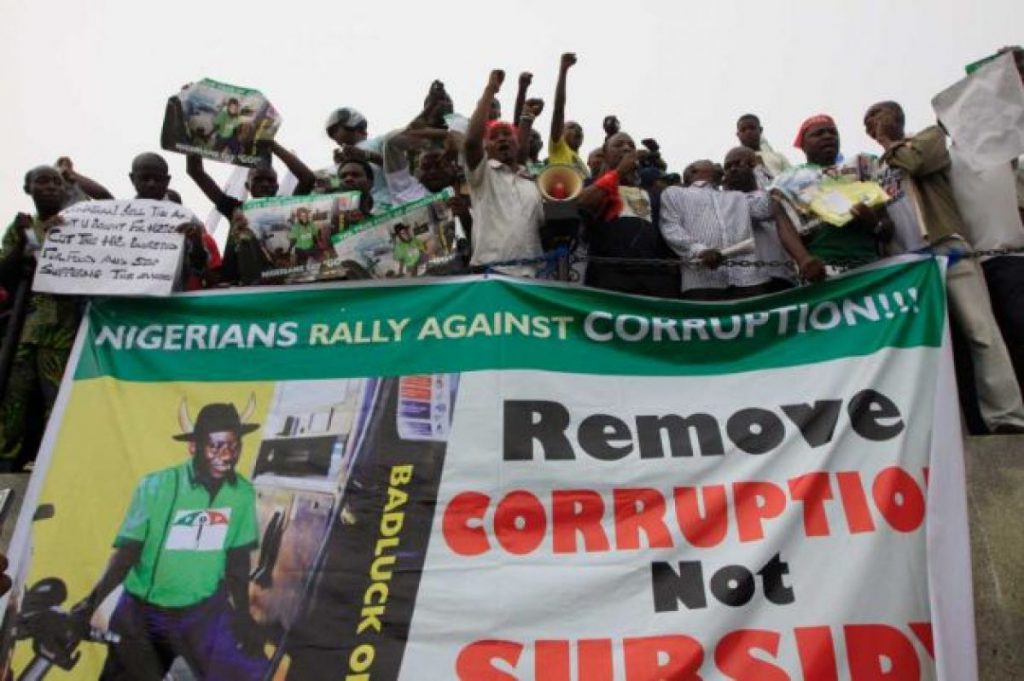As Nigerians now buy a litre of petrol at N900 it becomes fundamental to interrogate the action that led to the 2012 uprising where Nigerians poured out on the streets when the government of Mr. Goodluck Jonathan, former Nigerian president increased the price of petrol from N65 to N141 per litre.
The Civil society organizations, organized labour union and Nigerians held days of protest on the streets of major towns in Nigeria demanding the petrol increase be reverted to N65 per a litre, an action that forced the Jonathan government to reduce the price of petrol to N97 per litre.
In 2012, when the civil society organizations and organized labour rejected subsidy removal, their demands were very clear, (1) fix the refineries and stop the importation of refined crude (2) address the corruption in the oil sector and unbundle the NNPC (3) Nigerians are poor and cannot afford to have a huge financial burden that government wants to put on them as a result of petrol increase (4) address waste in government.
These were some of the core demands placed by the civil society organizations and organized labour before they will support the petrol price increase.
“The Goodluck Jonathan administration must accept that Nigerians have a right to benefit from their God-given resources. After all the Nigerian government has an agreement with OPEC to allocate 445,000 barrels a day for local refining and consumption” the organized Labour and Civil Society told Jonathan.
The Nigerian government develops a time-bound program for re-establishing the capacity to process and sell crude allocations to Nigerians at a cheap rate. Nigerians have entitlements that cannot be ignored or disregarded.
“That the Goodluck Jonathan Administration must accept basic democratic principles, the views of citizens must not only be accepted but must be the basis for all policy development and implementation” the Civil Society groups said.
However, the reality is that the Bola Ahmed Tinubu government did not address the same demand placed by the civil society organization and organized labour in 2012 before removing the petrol subsidy on the day he took over as the country’s president.
The refineries have not been fixed; Nigeria continues to import refined crude, and corruption in the oil sector is still high. The Tinubu government did not care, makes no consultation, no provision for palliative and removed the subsidy.
Less than three hours Tinubu government removed the petrol subsidy, huge queues have surfaced in filling stations across Lagos and other major cities with some persons in Delta State saying they are buying petrol at N423 per litre.
Mr. Jibrin Ibrahim, a professor of political science and former director of the Centre for Democracy and Development, was one of the major actors in the 2012 protest that held the Jonathan government accountable and rejected the petrol price increase.
However, in what appears to be his endorsement of petrol subsidy removal, Jibrin tweeted, “Things are tough for the commoner as fuel and electricity charges rise as inflation gallops. The new normal is that Nigeria is broke and we need to start paying real rates for our consumption as the capacity to subsidize has collapsed”.
I am sorry to disagree with Jirin, in 2012, I worked under Jibrin Ibrahim, and his arguments then were clear and apt, he told the government of Jonathan, to fix refineries and put in place local production and equitable distribution of petrol products so Nigerians can afford the price, remove government spending which amounted to waste and address corruption in NNPC.
Jibrin’s argument that the government is broke is not a new argument in Nigeria, the major argument of Jonathan’s government in 2012 about why it wanted to remove petrol subsidy and increase petrol price was that the government was broke.
We cannot justify the petrol price increase on Nigeria’s brokenness, the government ought to fix the refineries, ensure local production of the product, and equitable distribution, which was the argument of Jibrin, Labour and other Nigerians in 2012.
Until the Tinubu government fixes the refineries and stops the importation of refined crude, it has no moral ground to remove the petrol subsidy. This was the argument against Jonathan’s government in 2012 and nothing has changed.
Coordinator MAWA-Foundation

